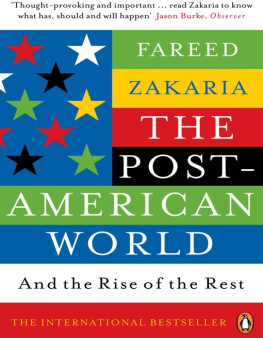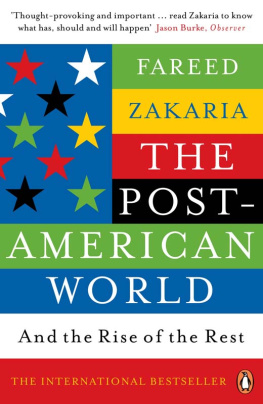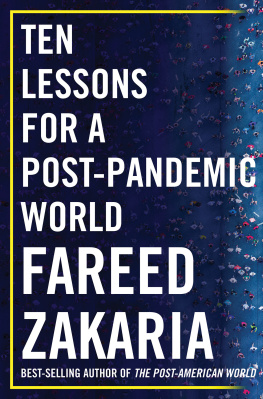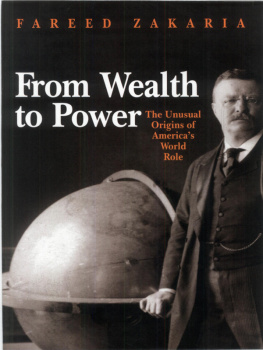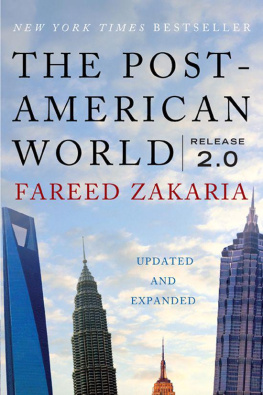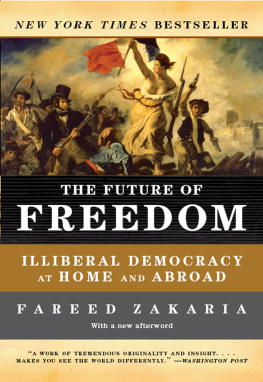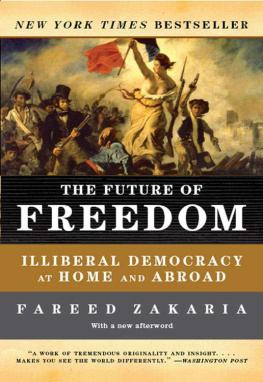
ALSO BY FAREED ZAKARIA
The Future of Freedom:
Illiberal Democracyat Home and Abroad
FromWealthto Power:
TheUnusual Origins of America s World Role
( coeditor )
The American Encounter:
TheUnited States and the Making of the Moder n World
The
Post-A merican
World

Fareed Zakaria

W. W. Norton & Company
New York London
Copyright 2008 by F a reed Zakaria
All rights reserved
Printed in the United States of America
First Edition
For information about permission to reproduce selections from this book, write to Permissions, W. W. Norton & Company, Inc., 500 Fifth Avenue, New York, NY 10110
For information about special discounts for bulk purchases, please contact
W. W. Norton Special Sales at or 800-233-4830
Manufacturing by RR Donnelley, Harrisonburg, VA Production manager: Anna Oler
Library of Congress Cataloging-in-Publication Data
Zakaria, Fareed.
The post-American world I Fareed Zakaria.
p. em.
Includes bibliographical references and index.
ISBN 978-0-393-06235-9 ( hardcover )
1. Twenty-first century-Forecasts. 2. International relationsForecasting. 3. International economic relationsForecasting. 4. United States-Foreign relations-21st century-Forecasting. 5. World politics-
21st century-Forecasting. I. Title.
CB161.Z34 2008
303.49-dc22 2008001306
W. W. Norton & Company, Inc.
500 Fifth Avenue, New York, N.Y. 10110 www.wwnorton.com
W. W. Norton & Company Ltd.
Castle House, 75/76 Wells Street, London W1T 3QT
567890
For
Arshad Zakaria

Growth takes place whenever a challenge evokes a successful response that, in turn, evokes a further and different challenge. We have not found any intrinsic
reason why this process should not repeat itself indefinitely,
even though a majority of civilizations have failed, as a matter of historical fact.
Arnold J. Toynbee
A Study of History

The
Post-American
World


The Rise of the Rest
his is a book not about the decline of America but rather about the rise of everyone else. It is about the great transformation taking place around the world, a
transformation that, though often discussed, remains poorly
understood. This is natural. Changes, even sea changes, take place gradually. Though we talk about a new era, the world seems to be one with which we are familiar. But in fact, it isvery different.
There have been three tectonic power shifts over the last five hundred years, fundamental changes in the distribution of power that have reshaped international life-its politics, eco nomics, and culture. The first was the rise of the Western world, a process that began in the fifteenth century and accel erated dramatically in the late eighteenth century. It produced modernity as we know it: science and technology, commerce and capitalism, the agricultural and industrial revolutions. It also produced the prolonged political dominance of the nations of the West.
The second shift, which took place in the closing years of
the nineteenth century, was the rise of the United States. Soon after it industrialized, the United States became the most powerful nation since imperial Rome, and the only one that was stronger than any likely combination of other nations. For most of the last century, the United States has dominated global economics, politics, science, and culture. For the last twenty years, that dominance has been unrivaled, a phenome non unprecedented in modern history.
We are now living through the third great power shift of the modern era. It could be called "the rise of the rest." Over the past few decades, countries all over the world have been expe riencing rates of economic growth that were once unthink able. While they have had booms and busts, the overall trend has been unambiguously upward. This growth has been most visible in Asia but is no longer confined to it. That is why to call this shift "the rise of Asia" does not describe it accurately. In 2006 and 2007, 124 countries grew at a rate of 4 percent or more. That includes more than 30 countries in Mrica, two thirds of the continent. Antoine van Agtmael, the fund man ager who coined the term "emerging markets," has identified the 25 companies most likely to be the world's next great multinationals. His list includes four companies each from Brazil, Mexico, South Korea, and Taiwan; three from India; two from China; and one each from Argentina, Chile, Malaysia, and South Mrica.
Look around. The tallest building in the world is now in Taipei, and it will soon be overtaken by one being built in Dubai. The world's richest man is Mexican, and its largest publicly traded corporation is Chinese. The world's biggest plane is built in Russia and Ukraine, its leading refinery is
under construction in India, and its largest factories are all in
China. By many measures, London is becoming the leading financial center, and the United Arab Emirates is home to the most richly endowed investment fund. Once quintessentially American icons have been appropriated byforeigners. The world's largest Ferris wheel is in Singapore. Its number one casino is not in Las Vegas but in Macao, which has also over taken Vegas in annual gambling revenues. The biggest movie industry, in terms of both movies made and tickets sold, is Bol lywood, not Hollywood. Even shopping, America's greatest sporting activity, has gone global. Of the top ten malls in the world, only one is in the United States; the world's biggest is in Beijing. Such lists are arbitrary, but it is striking that only ten years ago, America was at the top in many, if not most, of these categories.
It might seem strange to focus on growing prosperity when there are still hundreds of millions of people living in desperate poverty. But in fact, the share of people living on a dollar a day or less plummeted from 40 percent in 1981 to 18 percent in
2004, and is estimated to fall to 12 percent by 2015. China's growth alone has lifted more than 400 million people out of poverty. Poverty is falling in countries housing 80 percent of the world's population. The 50 countries where the earth's poorest people live are basket cases that need urgent attention. In the other 142-which include China, India, Brazil, Russia, Indone sia, Turkey, Kenya, and South Mrica-the poor are slowly being absorbed into productive and growing economies. For the first time ever, we are witnessing genuinely global growth. This iscreating an international system in which countries in all parts of the world are no longer objects or observers but players in their own right. It is the birth of a truly global order.
Next page
